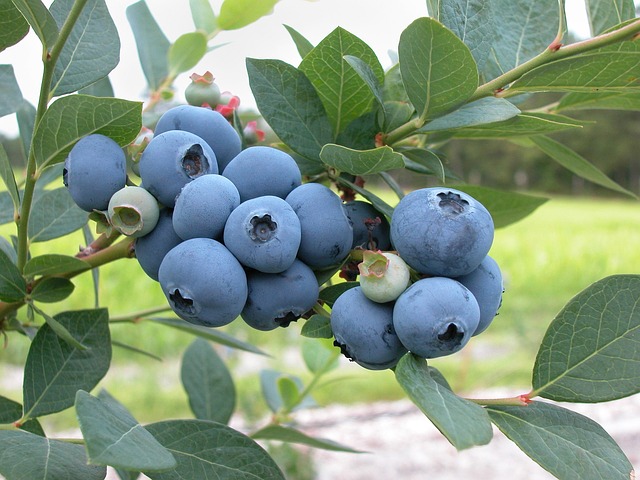by Lynda Kiernan
Gladstone Land has made its second permanent cropping acquisition in three months, announcing its agreement to buy two Michigan farms totaling 516 acres for approximately $7.8 million.
The two farms bring a combined total of 383 acres of blueberry bushes, and six acres of cranberry bogs, including farm-related assets of two blueberry processing facilities, and a fresh packing and cooling facility.
“These acquisitions allow us to expand our portfolio of high quality, fresh produce farmland,” said David Gladstone, president and CEO, Gladstone Land.
As part of the deal, Gladstone Land entered into a 10-year, triple-net lease with a leading regional blueberry grower and processor for each of the farms.
“We are very pleased to expand our farmland holdings and tenant relationships in Michigan,” said Joseph Van Wingerden, principal at Gladstone Land. “Michigan is one of the top three states for blueberry production with average volumes ranging between 80 to 100 million pounds per year. Western Michigan offers a great growing climate for blueberries and easy access to the East Coast and Midwest markets.”
Year-to-Date
This deal marks the third portfolio announcement made by Gladstone Land this year, which began with a January deal for the purchase of a 695-acre farm in Lincoln County, Nebraska, for $2.4 million.
Producing popcorn, edible beans, and potatoes, the parcel added an operation with 600 acres of irrigated, tillable land and three on-site wells with updated pivots and electrical panels to Gladstone’s holdings.
As is standard procedure for Gladstone, upon the acquisition, the company engaged the seller, Malmkar Farms of Grant, Nebraska, in a long-term lease agreement on the property.
“This is the first of what we hope will be many new acquisitions during 2019,” said CEO David Gladstone at the time.
Three months later, Gladstone continued to build out its well-curated and diversified portfolio of permanent crop operations, announcing it acquired California pistachio orchard operations for $28.6 million.
The orchards consist of 930 gross acres, of which 852 are planted in pistachio trees in their 11th leaf. In connection with the deal, Gladstone has entered into a 10-year, triple-net lease with The Specialty Crop Company, Inc., one of the world’s top nut growers, and the single largest grower of fresh and dried figs in the world.
“This orchard is located in an area with attributes conducive for growing pistachios, such as optimal climate conditions and good access to water,” said David Gladstone. “Our tenant, The Specialty Crop Company, is an ideal partner for us as we continue to add farmland growing specialty crops to our farmland holdings. And like most of our tenant-farmers, they are growing foods that are considered to be healthy.”
A Permanent Presence
As consumption trends have continued to shift toward healthy eating and wellness, Gladstone’s latest acquisitions have strengthened its standing in the production of fresh fruits and nuts.
In September of 2017 Gladstone made a flurry of permanent crop farming deals, acquiring White Hawk Vineyard – a 361-acre wine grape vineyard located in Santa Barbara County, California, for $5.4 million; and a 746-acre organic permanent crop farm in Walla Walla, Washington, growing apples, wine grapes, and cherries, for $9.5 million.
In December of that same year, Gladstone announced the acquisition of a California organic almond orchard for $5.9 million, and in 2018 the company acquired two California farms totaling 194 acres of cherry orchards for approximately $6.9 million, followed by the November purchase of a 951-acre fig and pistachio property.
Continuing in Confidence
This consistent growth of its farming portfolio continues at a time of market uncertainty due to recent tariffs and international trade tensions. However, Gladstone assures that it does not anticipate that these conditions will have any adverse impacts on its farming revenue streams, explains David Gladstone.
“The recent tariffs placed on certain Mexican goods are not expected to impact the Company, as we do not own any farms in Mexico, and the tariffs are also unlikely to hurt most of our farmers,” said Gladstone.
“Many of our fruit growers may even benefit if prices of produce from Mexico increase due to the tariffs. In general, tariffs do not hurt the fresh produce markets our farmers grow for because the produce is consumed within the U.S. And on the nut side of our business, while some almonds are sold to China, which has slowed consumption of conventional almonds, a large portion of the almonds grown on our farms are organic. Most organic almonds are not shipped to China or Mexico, rather they are sold within the U.S. to grocery stores or to power bar and cereal makers.”
He notes, “Our list of potential farms to purchase over the next several months is very robust, as we continue to grow.”
-Lynda Kiernan is Editor with GAI Media and daily contributor to GAI News. If you would like to submit a contribution for consideration, please contact Ms. Kiernan at lkiernan@globalaginvesting.com

